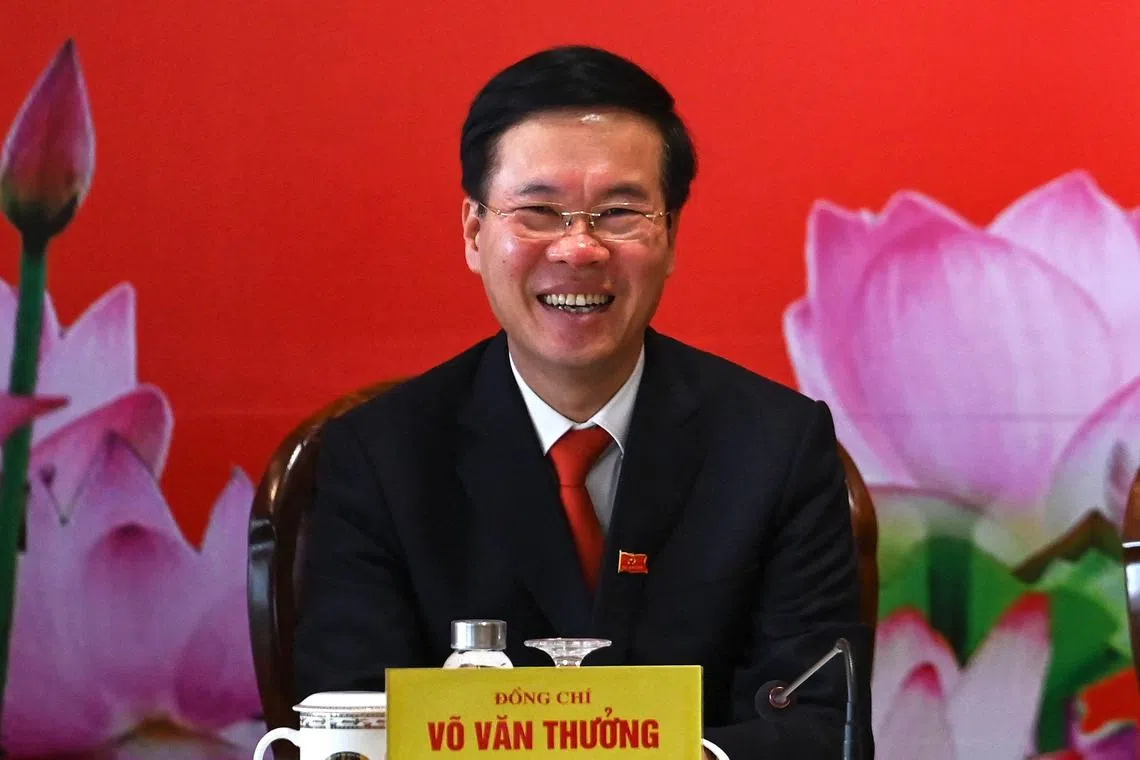Vietnam Parliament elects Vo Van Thuong as country’s president
Sign up now: Get ST's newsletters delivered to your inbox

Mr Vo Van Thuong is the youngest member of the party’s Politburo, but is considered a veteran of the party.
PHOTO: AFP
Follow topic:
HANOI – Vietnam’s National Assembly on Thursday elected Mr Vo Van Thuong as the country’s new president, in a reshuffle of the top leadership amid a sweeping anti-graft campaign.
In an extraordinary session, lawmakers confirmed Mr Thuong, 52, as president after the ruling Communist Party nominated him on Wednesday for the post, a largely ceremonial role but one of the top four political positions in the South-east Asian nation.
Mr Thuong’s election follows the sudden resignation in January of his predecessor Nguyen Xuan Phuc,
In his first speech to the Parliament as president, Mr Thuong said he will “resolutely” continue the fight against corruption.
“I will be absolutely loyal to the fatherland, the people and the Constitution, striving to fulfil the tasks assigned by the party, the state and the people,” Mr Thuong said in a statement that was broadcast on Vietnam’s state television.
Mr Thuong is the youngest member of the party’s Politburo, the country’s top decision-making body, but is considered a veteran of the party, having begun his political career in communist youth organisations during his university days.
He is widely regarded as being close to the party’s general secretary Nguyen Phu Trong, Vietnam’s most powerful figure, and the main architect of the party’s battle against corruption.
“The burning furnace campaign will not cool down in the foreseeable future,” said Mr Florian Feyerabend, the representative in Vietnam for Germany’s Konrad Adenauer Foundation, a think-tank.
Diplomats and business people have raised concerns about the anti-graft campaign because it has paralysed many routine transactions in Vietnam as officials fear being entangled in the crackdown.
A Hanoi-based diplomat said Mr Thuong’s election was a major step by general secretary Trong amid jockeying to succeed him, given the 78-year-old leader may step down before the end of his third term in 2026.
The general secretary is usually chosen from among one of the top leaders.
Mr Thuong was elected with 98.38 per cent of the votes, according to the Parliament’s online portal.
Analysts and investors viewed the election as indicating continuity in the country’s foreign and economic policies.
“There will be no major changes to Vietnam’s foreign policy following Thuong’s election,” said Dr Le Hong Hiep, senior fellow and Vietnam expert at Singapore’s ISEAS – Yusof Ishak Institute.
A Vietnam-based foreign investor, who declined to be named, said the elections put an end to uncertainty caused by the sudden dismissal of the former president. “It means stability and predictability is restored,” he said.
Vietnam is a major recipient of foreign investment, with business leaders often citing its political stability as a key reason for investing. REUTERS

